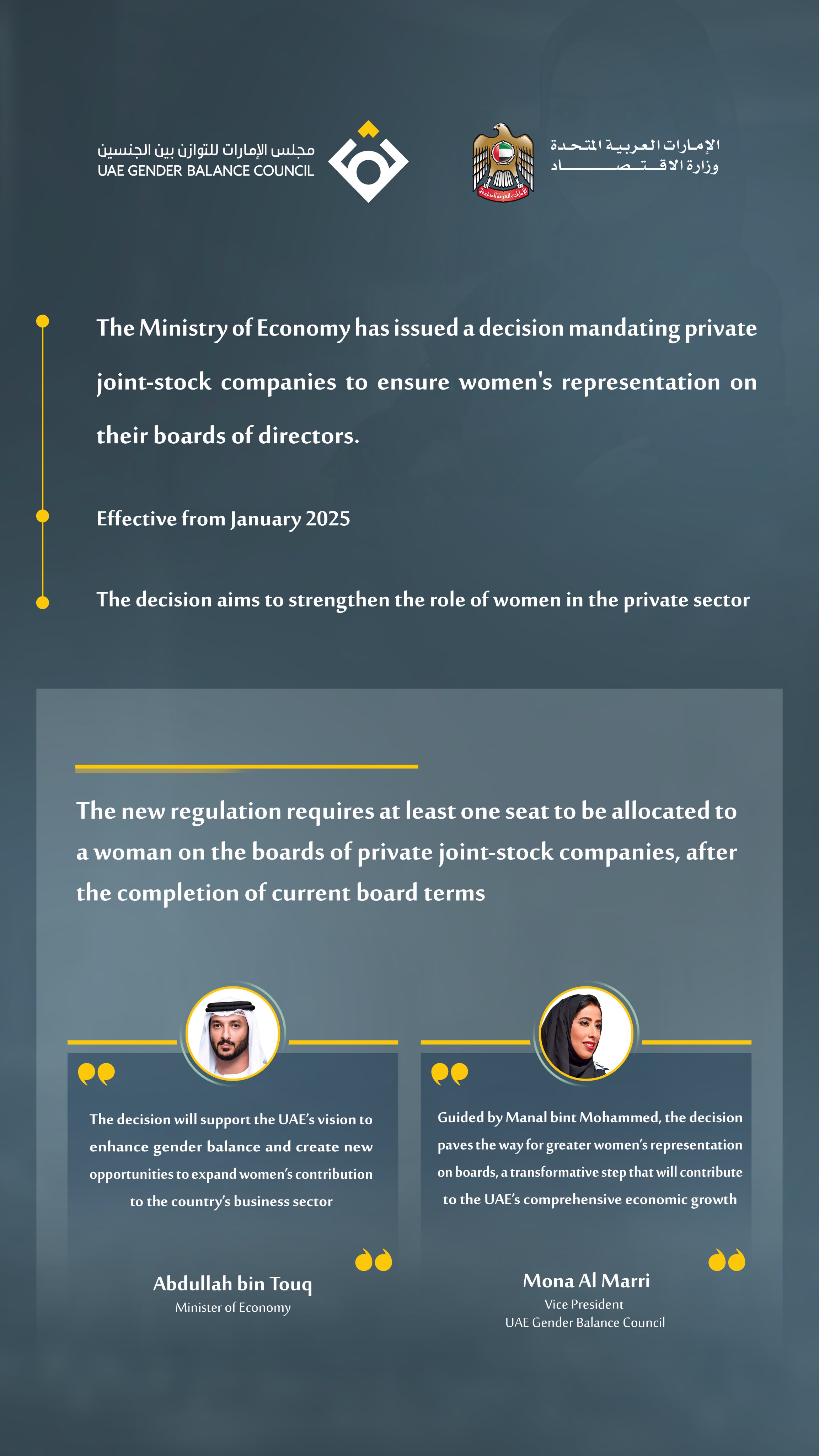
UAE mandates women representation on Private Company Boards
DiversityEconomy & Policy#BusinessTransformation#Trending#DEIB
The UAE Ministry of Economy is advancing gender equality with a new mandate requiring private joint-stock companies to allocate at least one seat for women on their boards of directors, effective January 2025.
This initiative, part of Ministerial Resolution 137 of 2024, aims to strengthen corporate diversity and builds on the 2021 mandate for public joint-stock companies in Abu Dhabi and Dubai. It reflects the UAE’s commitment to empowering women in leadership roles and advancing sustainable development.
“The UAE Ministry of Economy has issued a decision mandating private joint-stock companies to represent women on their boards of directors. Effective from January 2025, the decision aims to enhance the role of women in the private sector. The new decision requires private joint-stock companies in the UAE to allocate at least one seat for women on their boards of directors after the completion of the current board's term,” posted Dubai Media Office on x.com.

Abdulla bin Touq Al Marri, UAE Minister of Economy, commented, “Under the guidance of the UAE’s leadership, the nation remains dedicated to strengthening women’s contributions across various fields, especially in economic development. The latest decision reinforces the UAE's vision to enhance gender balance, empower women in the business sector, and increase their presence in leadership and decision-making roles. We express deep gratitude to Manal MR Al Maktoum, President of the UAE Gender Balance Council, for her tireless efforts to increase women's participation in the economy.”
“Over the past decades, women in the UAE have consistently proven their capabilities, making significant contributions to the business, financial, and investment sectors. Today, they are indispensable partners in economic growth and vital to the UAE's global competitiveness. This decision will bring added value to private joint-stock companies, enhancing their institutional performance by drawing on the insights and experiences of successful businesswomen in the country,” he added.
Mona Ghanem Al Marri, Vice President of the UAE Gender Balance Council, said, “The decision paves the way for greater women’s representation on boards, a transformative step that will contribute to the UAE’s comprehensive economic growth. The decision reflects the close, fruitful collaboration, demonstrating the country’s unwavering commitment to empowering women.”
UAE Gender Balance Council President, Manal MR Al Maktoum’s initiatives, including the ‘Women on International Boards’ programme and the ‘SDG 5 Pledge to Accelerate Gender Balance in the UAE Private Sector,’ have been pivotal in promoting gender balance in the industrial sector. These programmes aim to increase women's representation in leadership roles to 30 per cent by 2025. Through these efforts, the UAE is working to strengthen women's presence in decision-making positions and accelerate progress toward gender equality in both the public and private sectors.
In March 2021, the UAE mandated listed companies to have at least one female director on their boards. By 2022, women held 77 board seats, up from 29 in 2020, accounting for 8.9 percent of board seats in 115 listed companies. The country has also committed AED 55 million ($15M) to UN Women for global gender equality efforts. In March, the UAE ranked seventh globally on the Gender Inequality Index, reflecting its progress in reducing gender disparity, according to the Aurora50 Dubai report.
You may also like:
- Migration of Indian Women workers to MENA
- Emirati Women’s Day 2024 - Celebrating women of action for tomorrow
- Leveraging benefits to support, attract and retain women workers
- How to ensure women stay longer in your organisation?
“Gender equality is encouraged in the UAE through policies that promote equal opportunities, support women's leadership roles, and create an inclusive workforce environment. Gender diversity in the workplace offers numerous benefits, including enhanced innovation, improved decision-making, and better financial performance. It fosters a more inclusive and equitable environment, which can lead to higher employee satisfaction and retention. Additionally, diverse leadership teams can better understand and serve a diverse customer base, driving business growth and success,” said Shaikha Al Naqbi, Head of Contracting at First Abu Dhabi Bank, on the landmark decision.









